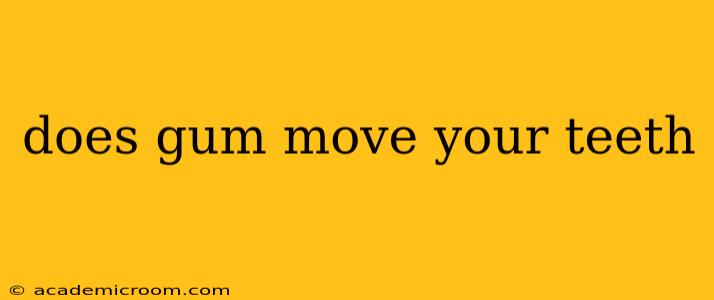Does Gum Move Your Teeth? The Surprising Truth About Chewing Gum and Oral Health
The question of whether chewing gum moves your teeth is a surprisingly complex one, sparking curiosity and debate among dentists and the public alike. While the idea of your teeth shifting position due to chewing gum might seem far-fetched, the truth is more nuanced than a simple yes or no. Let's delve into the science behind this common query.
Can Chewing Gum Straighten Teeth?
The short answer is: no, chewing gum cannot straighten teeth. While chewing does exert some force on your teeth, it's not the controlled, consistent pressure needed for orthodontic movement. Orthodontic treatment uses precisely calibrated appliances to gradually shift teeth into their correct positions. Chewing gum, on the other hand, provides sporadic, inconsistent pressure. The force is insufficient and lacks the directionality required to make significant changes to tooth alignment.
Does Chewing Gum Affect Tooth Position at All?
While chewing gum won't straighten your teeth, it can exert minor forces that might subtly influence their position over an extended period. Think of it like this: a constant, slight push against a wall might eventually cause it to shift over many years, but the movement would be minuscule and hardly noticeable. Similarly, aggressive or prolonged chewing might cause very slight, temporary shifts in tooth position, but these will not be permanent and will return to their original alignment once chewing stops.
What About the "People Also Ask" Questions?
This section addresses common related queries found online to provide a comprehensive overview of the topic.
1. Can chewing gum cause teeth to loosen?
Excessive or forceful chewing gum can potentially contribute to loosening teeth, particularly if you have gum disease or weak periodontal ligaments. Healthy teeth are firmly anchored in the jawbone, but persistent, strong pressure can put undue stress on these structures over time. It's crucial to practice moderation when chewing gum and to address any existing dental issues promptly.
2. Does chewing sugar-free gum help with teeth alignment?
No, sugar-free gum does not help with teeth alignment. While it might provide some minor benefits for saliva production and cleaning away food particles, it lacks the controlled force needed for orthodontic correction.
3. Can chewing gum damage teeth?
Chewing gum itself is not inherently damaging to teeth, but certain practices can be detrimental:
- Excessive chewing: Excessive chewing can lead to jaw pain and potential damage to teeth and fillings.
- Chewing hard candies along with gum: Combining chewing gum with hard candies dramatically increases the risk of chipping or cracking teeth.
- Gum with sugar: Sugar-containing gum can contribute to cavities and tooth decay. Always opt for sugar-free varieties.
4. What are the benefits of chewing sugar-free gum?
Sugar-free gum offers several potential oral health benefits:
- Increased saliva production: Saliva helps neutralize acids and wash away food particles, preventing tooth decay.
- Improved oral hygiene: Chewing gum can help remove food debris from between teeth.
- Strengthened jaw muscles: Chewing gum provides a mild workout for your jaw muscles. (However, excessive chewing can be detrimental).
Conclusion:
While chewing gum won't magically straighten your teeth or cause significant shifts in their position, it's essential to be mindful of your chewing habits. Excessive or forceful chewing can potentially cause problems, so moderation is key. If you have concerns about your teeth's alignment, consult an orthodontist for professional advice and treatment. For maintaining overall oral health, remember that regular brushing, flossing, and dental checkups are far more effective than relying on chewing gum.
